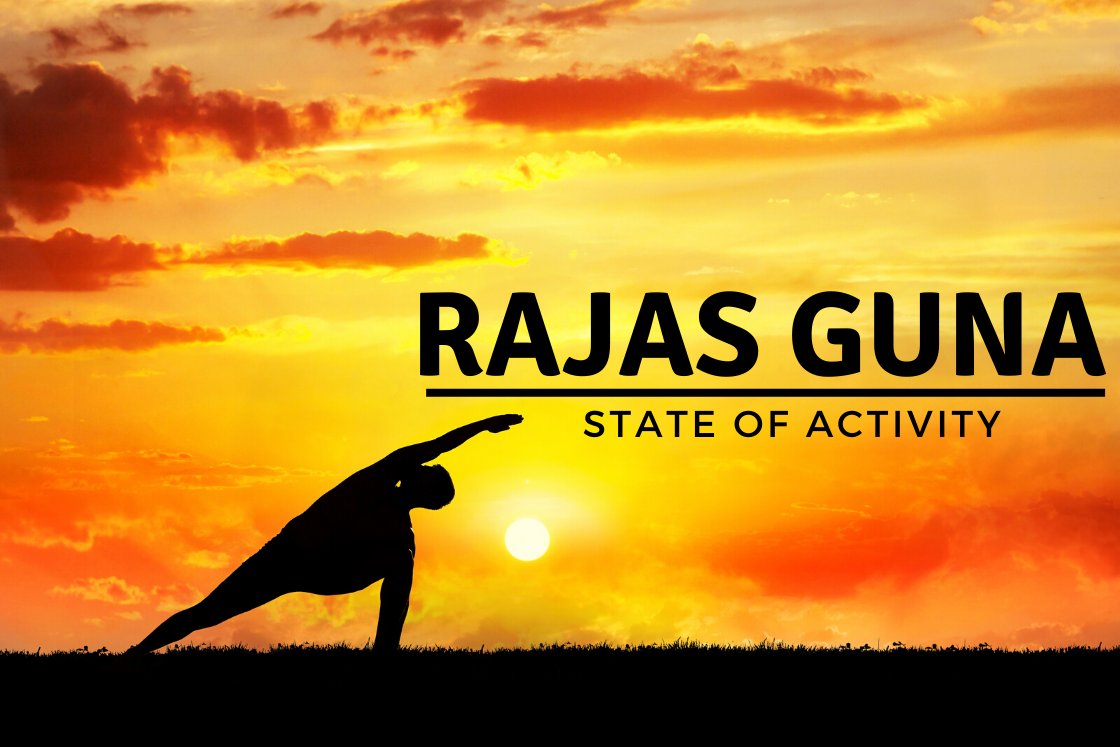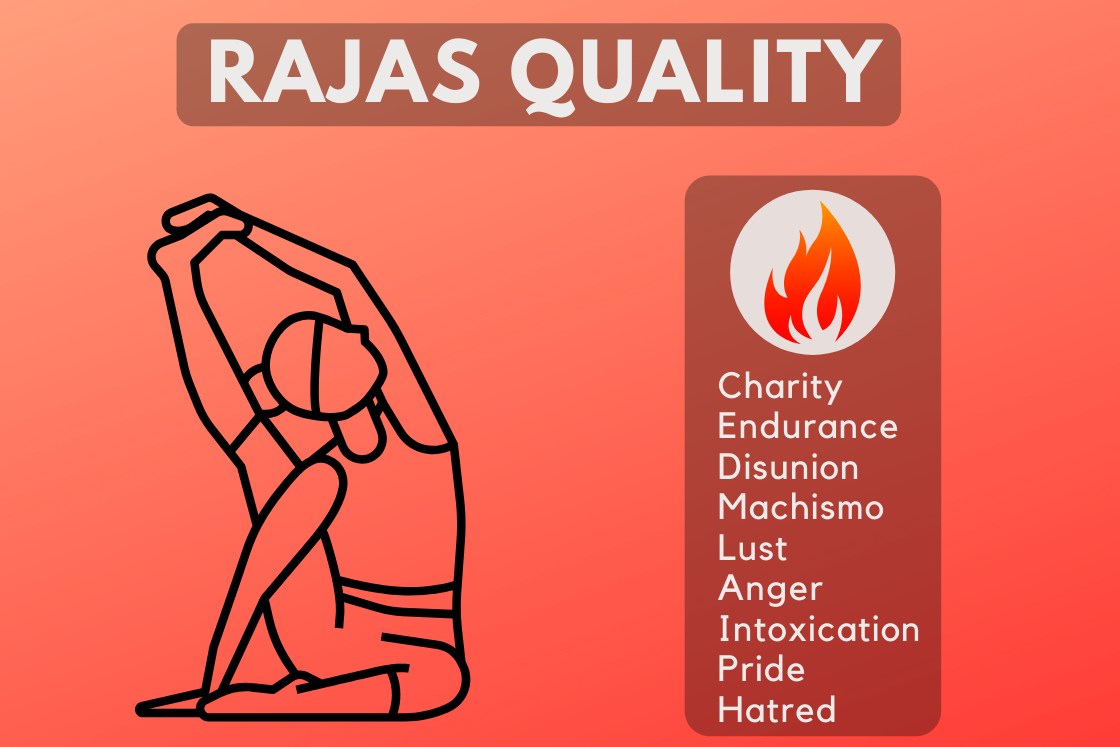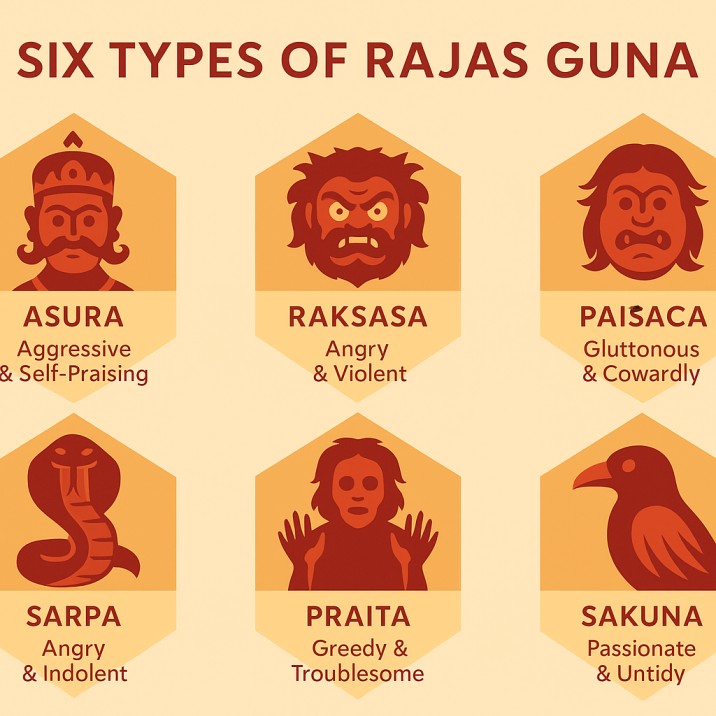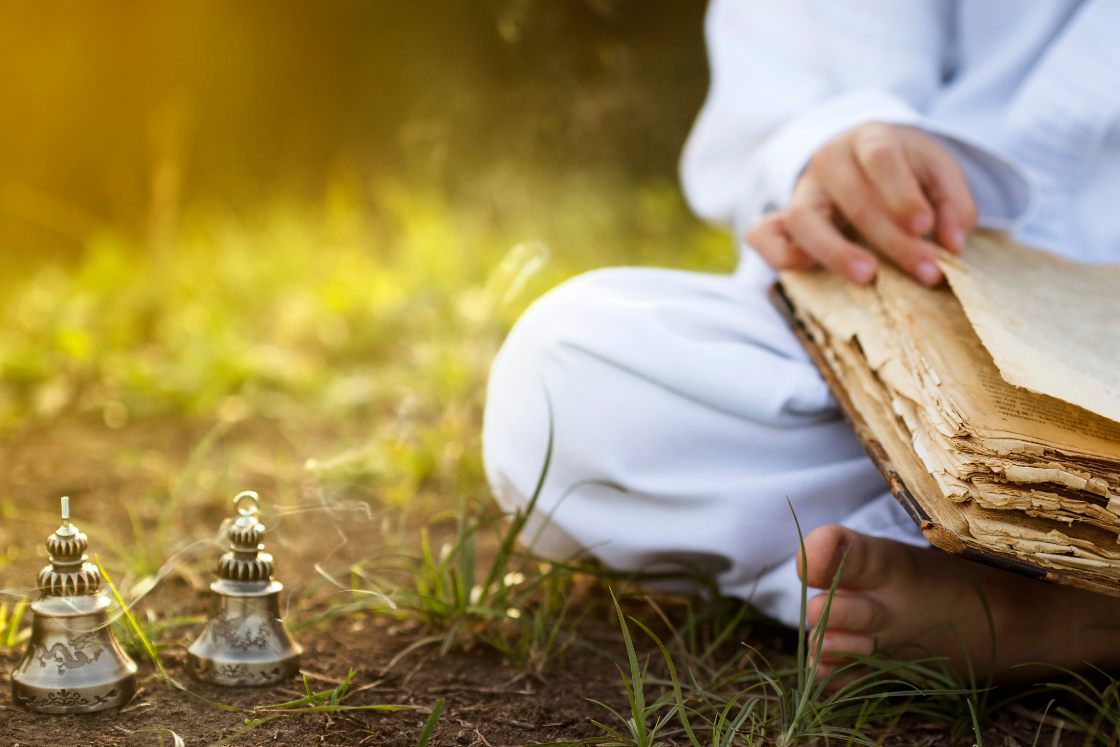
Rajas Guna is the quality in a person or substance that promotes motion, activity, and restlessness. When Rajas dominates the chitta (mind-stuff), thoughts become scattered, and the mind remains in constant movement. This restless energy is one reason why meditation often feels difficult at first.
Among the three gunas Sattva, Rajas, and Tamas– Rajas acts as the dynamic force between the other two. Tamas represents inertia or inactivity, Rajas drives movement and desire, while Sattva arises when both are in balance.
However, when Rajas becomes excessive, it leads to overthinking, hyperactivity, anxiety, and emotional imbalance. Learning to recognise and balance this energy helps bring the mind toward a sattvic, calm state.
Identify your rajas guna

Every person has all three gunas within them, but one tends to dominate at a given time. To identify Rajas Guna, observe your thoughts, emotions, and actions throughout the day. Your reactions to situations reveal which guna is guiding your state of mind.
When Rajas Guna is dominant, you may notice these traits:
1. Passionate and impulsive
People influenced by Rajas are often full of desires and driven by ambition. They are constantly striving for more, more success, more pleasure, more recognition. This endless craving creates restlessness and inner agitation.
They also tend to act on impulse, making quick decisions without reflection, which can later lead to regret.
2. Defect seeker (Forget Good Deeds)
A Rajasic mind tends to see faults more easily than virtues. It often highlights others’ mistakes, weaknesses, or negative traits, while ignoring their good qualities. This critical outlook leads to feelings of jealousy, bitterness, and an inability to forgive.
3. Seeks for new
Those with strong Rajas Guna struggle to stay content with what they have. They constantly seek new experiences, people, or material pleasures to feel satisfied. However, this craving makes it difficult to form lasting relationships or find true inner peace.
4. Self-centred and seeks attention
Rajas-dominant individuals are often self-focused. They may lack compassion for others and care little about the happiness of those around them. Their actions are usually driven by the desire for name, fame, or public recognition rather than genuine goodwill. Even acts of kindness may be performed for show.
5. Angry and Fearful
Excess Rajas Guna leads to anxiety, impatience, and emotional instability. People with dominant Rajas often fear losing control, status, or success. They worry about being left behind or outdone, which makes them quick to anger and easily agitated.
Rajas guna in yoga practice

During yoga practice, all three gunas Sattva, Rajas, and Tamas are active within you to varying degrees.
You may notice Rajas Guna when you’re forcing yourself deeper into a posture, even when your body is not ready. Despite discomfort or pain, you keep pushing, driven by the desire to “achieve” the full expression of the pose. This intense effort, often disconnected from awareness, reflects the restless and ambitious nature of Rajas.
In contrast, when you move mindfully—staying aware of your limits and maintaining a healthy balance between effort and ease you begin to experience a more effortless flow. The posture feels more natural and balanced. This is a sign that your mind has shifted into a sattvic state, where clarity, stability, and calmness prevail.
Types of rajas guna (based on behaviour)
According to yogic philosophy, human personality can be classified into 16 types based on the three gunas – seven sattvic, six rajasic, and three tamasic.

The six forms of Rajas Guna are categorised by behavioural tendencies:
1. Asura (Sharing Traits of Asura/villain)
Asura-type Rajasic people are brave, aggressive, self-praising, and often speak ill of others. They tend to be tough-minded, assertive, and sometimes intimidating in appearance and behaviour.
2. Raksasa (Sharing Traits of Raksasa)
Those with Raksasa traits are often filled with anger, jealousy, and violence. They enjoy non-vegetarian food, oversleeping, and laziness. Their intolerance and frequent outbursts make them unstable and hard to calm.
3. Paisaca (Sharing Traits of Pisaca (evil being)
People with Paisaca traits are gluttonous and driven by base desires. They tend to be unclean, cowardly, and indulge in abnormal or unhealthy diets. Their behaviour often reflects lower instincts and lack of control.
4. Sarpa (Sharing Traits of Snake)
Sarpa-type individuals are brave in anger but cowardly when calm. They have sharp reactions and a lazy nature. Although not gluttonous, they are often tense and anxious.
5. Praita (Sharing Traits of Departed Spirit)
These people are excessively greedy, troublesome, and engage in backbiting. They have an insatiable appetite for food and lack discipline in their daily habits. Irregularity and disorder are common in their lifestyle.
6. Sakuna (Sharing Traits of Sakuni-Bird)
Sakuna-type Rajasic individuals are attached to pleasures and food. They are often untidy, disorganised, and emotionally unstable. Their minds constantly jump from one desire to another, much like a restless bird.
How to reduce rajas guna

Although Rajas Guna provides energy and drive, too much of it leads to restlessness, anxiety, and imbalance. Reducing this guna is essential to develop a Sattvic (peaceful and clear) state of mind.
Here are some practical ways to reduce the dominance of Rajas Guna:
1. Practicing Restorative or Counter Pose
In your yoga practice, include restorative poses to calm the nervous system and reduce rajasic energy. After intense backbends or forward bends, follow up with counterposes to bring the body into balance.
2. Cooling down by Pranayama
Breathwork has a powerful effect on the mind. To reduce Rajas, practise cooling pranayama such as:
3. Improving Eating Habits
What you eat directly influences your mental state. Foods that are spicy, oily, bitter, sour, or overly salty are rajasic and increase restlessness.
To reduce Rajas:
- Avoid fried, processed, or spicy foods.
- Eat light, fresh, and sattvic meals.
- Include more fruits, vegetables, whole grains, and plant-based proteins in your diet.
4. Give Your Senses Soothing Vibes
Your environment affects your state of mind. Loud, violent, or chaotic visuals and sounds increase rajasic tendencies.
Choose calming music, natural visuals, and positive content to soothe your senses. Creating a peaceful space supports a more sattvic mindset
5. Sleep Adequately
Lack of sleep makes the mind irritable and hyperactive, while too much sleep leads to dullness.
Aim for balanced, quality sleep to give your body and mind time to rest, recover, and regulate emotional energy.
6. Spend Time with Yourself
grāmo rājasa ucyate
“Residence in village or town is in the Rajas Guna.” – Srimad Bhagavatam 11.25.25
Srimad Bhagavatam says, living away from nature is a characteristic of Rajas Guna. The busy life, away from nature, increases the qualities of this Guna. Therefore, take a break and give some time to yourself, in the lap of nature.
7. Think for Other’s Wellbeing
rājasaṁ phala-saṅkalpaṁ
“Work performed with a desire to enjoy the results is in the Rajas Guna.”- Srimad Bhagavatam 11.25.23
The activities done selfishly are Rajas. So, to balance it, try to perform activities thinking about others. Also, try not to be self-centered and selfish.
You can learn by karma yoga how to do selflessly work. It will increase the sense of satisfaction and joy inside you, which leads toward sattva.
Conclusion
As you begin to reduce Rajas Guna, remember to avoid slipping into Tamas (inactivity or dullness). The goal is to cultivate Sattva, which brings peace, clarity, and balance.
To truly balance Rajas Guna, you’ll need to adjust your diet, lifestyle, and daily habits. It may feel challenging at first, especially if you’re used to fast-paced or stimulating routines. But with patience, consistency, and inner commitment, you’ll gradually feel a shift.
Over time, you’ll notice improved calmness, clarity of thought, and a deeper sense of well-being.





Excellence post. Keep posting like this. Try to post in hindi also so many people will get this knowledge.
Nice